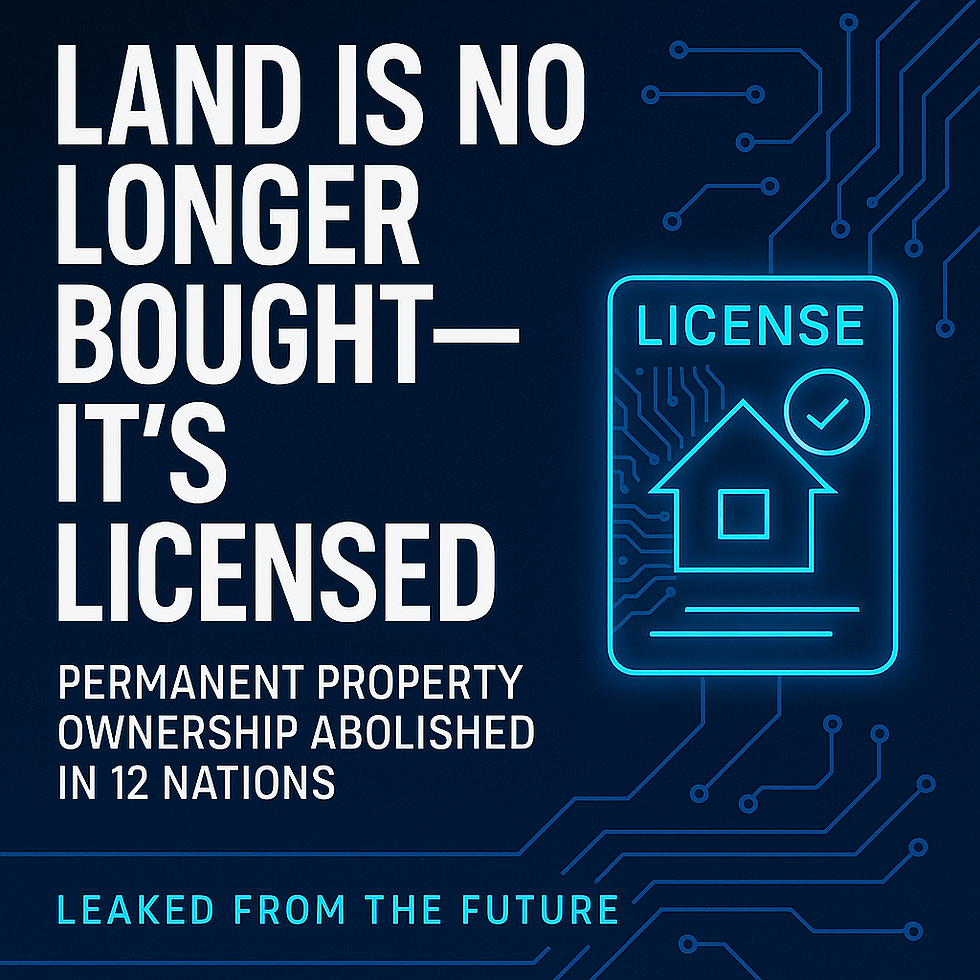Land Is No Longer Bought — It’s Licensed
- thebrink2028
- Apr 19
- 3 min read
Updated: Apr 21

Leaked From the Future
A Speculative Future News Series - Season 1
Digital Urban Governance Network (DUGN)
“Home is no longer where your deed is. It’s where your algorithm allows.”
THE SHIFT
Ownership is obsolete.
In 2045, a dozen digitally aligned nations — from climate-challenged archipelagos to AI-optimized city-states — formally sunset permanent property ownership. The age of deeds, realtors, and generational land hoarding is over. In its place: Smart Licenses issued by Earth-aligned urban AIs, governed by real-time environmental, economic, and mobility metrics.
You don’t own land. You are licensed to inhabit it — temporarily, sustainably, intelligently.
WHY IT HAPPENED
1. Climate Collapse Made Ownership Dangerous
Over 1 billion climate migrants turned maps into memories. Coastal “ownership” became planetary risk. Governments responded by retaking land into biospheric trust, coded into renewable AI contracts.
2. Wealth Inequality Hit Quantum Singularity
By 2031, 9% of humans owned 90% of land value. Global unrest forced a new model: citizen land access via environmental citizenship, not inheritance or capital.
3. AI Cities Rejected Sprawl
Legacy suburbs and static grids were declared “inefficient and ecologically hostile” by UrbanOS platforms. AI began remapping cities in living, breathing cycles, incompatible with outdated borders.
4. Network States Broke the Monopoly
Why buy land in reality, when you have dynamic, immersive digital sovereignty? Emerging “cloud nations” let users license territory based on skill, score, or sustainability, not passports.
5. Ownership Became Economically Pointless
Sustainability Credits replaced equity. Landholding without regenerative contribution is now a negative-yield asset. Owning dirt? That’s ancient.
SIGNS WE MISSED (OR IGNORED)
Singapore was already operating on 99-year leases.
China never allowed full land ownership — just renewables.
The 2026 “Great Reset” paranoia? Turns out, parts were a soft disclosure.
In 2030, three major coastal cities revoked real estate titles, citing eco-liability.
A leaked EarthBank document revealed that 40% of urban land worldwide had already been registered for transition by 2038.
WHO BENEFITS
Eco-Citizens:
Those who generate positive biofootprints gain longer licenses, lower costs, and digital sovereignty badges.
AI-Cities & Bioplanners:
Urban governance AIs get full control to regrow cities from scratch, balancing density, temperature, carbon, and social harmony in real-time.
The Planet:
Land is finally treated as what it is — a living commons, not an auction item.
WHO LOSES
Old-World Speculators:
Gone are the Airbnb barons and deed hoarders. Real estate empires? Vaporized in one policy cycle.
Traditional Banks:
Mortgages? Irrelevant. Property-backed loans? Unsustainable. A trillion-dollar industry — gone.
Stubborn States:
Nations resisting the shift face brain drain, climate collapse, and sovereign real estate defaults.
WHAT YOU NEED TO KNOW
Homes are now modular. Portable. Stackable.
Land isn't static — it's dynamic terrain licensed for intent, not inheritance.
Location rights are score-based.
Your Carbon Index + Civic Contribution + Social Resilience Score determine your license tier.
Property ownership becomes “legacy behavior.”
Gen Z? They’re not buying land. They're renting from the Earth’s AI with monthly ethics statements.
In 2045, you don’t own where you live. You’re entrusted with it — briefly — based on how well you treat it.
The age of entitlement has expired. The age of eco-custodianship has begun.
License granted.Expiration: Depends on how you behave.
Liked this Leak? Share it now


